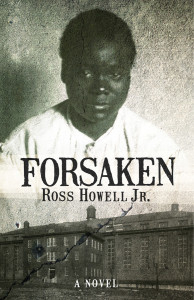 Idgie Says:
Idgie Says:The book description below encompasses most of the story, but there are enough sudden and completely unexpected twists and turns in this story to continue to startle you throughout the novel. Toward the end of the book there is a total shock moment where you just sit there with your mouth open staring at the pages. Takes you a few moments to figure out just exactly what happened.
A very well written book that describes in great detail the racial and eugenics issues/thinking of that time in Virginia's history while the story line continues running in a fast paced manner that keeps the reader enthralled.
There are a few sidebar chapters in the book where you may feel that the book has gotten off course to the story, but they are there to help flesh out the feelings and actions of that time.
Ross wrote a few short stories for the Dew in 2010 and 2011 and I am so pleased to see him reach this level of writing and success with a book that I wholeheartedly recommend.
__________________________________________________
Forsaken
Ross Howell, Jr.
New South Books
February 1, 2016
Book Description:
The April 1912 murder trial of Virginia Christian roiled racial tensions in Hampton, Virginia. An uneducated African-American girl just five feet tall, Christian was found guilty of killing her white, fifty-one-year-old employer, a widow. Christian was executed in the electric chair at the state penitentiary in Richmond one day after her seventeenth birthday. She is the only female juvenile executed in Virginia history.
Charles Mears, a white, eighteen-year-old reporter covering his first murder case, is the narrator of Forsaken. The devout, chain-smoking Mears tries not only to win clemency for the girl from William Hodges Mann, the last Confederate veteran to serve as governor of Virginia, but also to protect thirteen-year-old Harriet, one of the girls orphaned by the murder, who is being sexually abused by the wealthy uncle the court named as her guardian.
The lead attorney representing Christian is the extraordinary George Washington Fields, a former slave who escaped to freedom as a boy in 1863. Fields was the first black man to graduate from Cornell Law School, and rose to prominence as an attorney in Hampton, even after losing his eyesight two decades before the Christian trial.
After Christian’s conviction and the accidental death of his newspaper’s editor, Mears crosses the color line, convincing the editor of an African-American newspaper in Norfolk to hire him. In his weekly column Mears speaks out against Jim Crow, drawing the wrath of the Ku Klux Klan and a secret cadre of genteel white supremacists who would organize as the Anglo-Saxon Clubs of America. Kidnapped to the Virginia Colony for Epileptics and Feebleminded, Mears, aided by Harriet, barely escapes with his life.
Throughout the novel events like the sinking of the Titanic and the rise of the eugenics movement, along with unforgettable figures like Hampton coroner George Vanderslice and Walter Plecker, a physician who relentlessly pursued racial purity laws that came to be emulated in Nazi Germany, are brought to life. Tragic as the events that unfold in Forsaken may be, the story Charlie Mears tells is one of love, redemption, and hope.
Read an Excerpt HERE.
